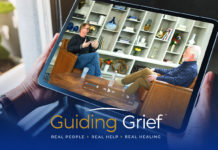By Leader Contributor Alan D. Wolfelt, Ph.D.
Our phone at the Center for Loss and Life Transition has been ringing off the hook in recent weeks with requests for my opinion of the new “PGD” diagnosis. Yes, everyone’s talking about the new “disorder” included in the latest release of the Diagnostic and Statistical Manual of Mental Health Disorders (DSM-5).
Psychiatrists and other mental health professionals can now, at their discretion, diagnose an adult patient with “prolonged grief disorder,” or PGD, one year or more after the death of someone loved (just six months for children).
According to the DSM, PGD is characterized by daily, intense yearning for the person who died and/or a preoccupation with thoughts or memories of this person. Three additional symptoms from the following array are also required: identity confusion, disbelief, avoidance of reminders of the death, intense emotional pain, difficulty engaging with others and with life, emotional numbness, feelings that life is meaningless, and intense loneliness.
According to recent studies, say the experts who lobbied for the inclusion of PGD in the DSM, about 1 in 10 grievers suffer from PGD.
My position is this: I disagree. I’ve been a grief counselor and educator for more than 40 years now. I’ve spoken and worked with thousands of grieving people. Here are the essentials they’ve taught me:
• Grief is normal and necessary. It’s simply love after loss.
• Because love doesn’t end, neither does grief.
• The normal melancholy of grief often continues well beyond a year.
• To integrate it into our ongoing lives, grief takes expression (i.e., mourning), the support of others, and an indeterminate amount of time.
Here’s another way of thinking about it: Grief is love’s conjoined twin. Grief is what we feel when we are separated from the object of our love. Without love, there would be no grief. And if love is not a disorder, illness, or diagnosis, then neither is grief.
I’ll say it again: Grief is not a disorder. In my experience, even grief meeting the criteria set forth under “prolonged grief disorder” in the new DSM is not pathological. If it were, most of us would be diagnosed with PGD at some point in our lives. Historically, we better understood that Thomas Kempis was right when he observed that if you live very long on this earth you will experience some “proper sorrows of the soul.”
Pathologizing Grief and Mourning
Mourning is grief gone public. It’s the outward expression of our inner thoughts and feelings of grief. It’s our shared social response to loss. Whenever we cry, talk about our grief, or in any way express our anger or sadness or shock or any other thought or feeling about a loss, we’re mourning. And mourning, like grief, is necessary. Mourning is what allows us to ultimately reconcile our grief and find our way to a new normal.
Unfortunately, some in our culture have decided that open and honest mourning is inappropriate and improper. Many mourners are pressured to keep their normal and necessary grief inside of themselves. Spoken or unspoken, messages such as “carry on,” “keep your chin up,” and “keep busy” all too often prevail. That’s why myself and other authors often refer to North America as an “emotion-phobic” or “mourning-avoidant” culture.
I would say that even the inner experience of grief has been tainted by this thinking. We are told we have a right to happiness. We are told that emotional and spiritual pain are bad and that we deserve to quell them as quickly as possible. But if sadness is maladaptive, then grief is also maladaptive, right?
No wonder we ended up with grief and mourning too often being considered illnesses. No wonder we ended up with this unfortunate diagnosis.
Complicated Grief
We all need the support of others if we are to reconcile our grief and go on to live a renewed, full life of love, meaning, and purpose. But sometimes we need extra help. In those situations, I call it “naturally complicated grief.”
First, let me clarify that I believe all grief is complicated. Just as love is always complex and multifaceted, so too is grief. Whenever someone we love dies, we naturally have lots of different and ever-changing thoughts and feelings about the death. Grief is often profoundly challenging and chaotic. In fact, it’s common for grievers to feel like there is something wrong with them because their inner experience of loss as well as their outward behavior are so different from their usual thoughts and feelings. The experience I’m calling “naturally complicated grief” is grief that has gotten extra complicated somehow. It’s a matter of degree, feature prominence, and sometimes, yes, duration.
My professional experience has taught me that complicated grief is grief that has gotten stuck or off track somehow. It has encountered barriers or detours of one kind or another, and as a result has become stalled, waylaid, or denied altogether. It is not, however, abnormal or pathological. It is not a disorder. Instead, it is a normal response in what is almost always an abnormally challenging loss situation.
I use the word “complicated” to describe stuck, off-track, or denied grief because it better honors the unavoidable spiritual challenges of human life. It’s also more hopeful. If something’s complicated, you can uncomplicate it. You can tease apart and work through the complexities. What’s more, it’s not the human being who’s “disordered” — it’s the potential convergence of numerous factors that can contribute to the complications of grief. I have found that we often label things “disorders” when we lose an understanding of them.
Caring for Versus Curing
Under the traditional medical model, the aim is to cure disorders. Curing is a medical term that means “remedying,” “correcting,” or “eradicating.” Yet grief is not an illness. It’s a normal human response to being “torn apart,” which is what the word “bereavement” means. It can only be cared for. Caring is about honoring a transformation of the heart and soul. Caring is about being a companion who walks alongside — not in front of — and accompanies grieving people as they find their way out of the darkness and into the light.
Grief therapists do need frameworks that help them understand, identify, and support grievers struggling with complications of their grief. If you’re interested in the companioning model of complicated grief care, I would refer you to my book When Grief is Complicated: A Model for Therapists.
In Summary
The difference between “prolonged grief disorder” and “complicated grief” may seem like semantics, but it’s more than that. First, the term “prolonged” implies that one year is sufficient for deep grief, but this is an arbitrary cutoff. The truth is that there is no timetable to healing in grief. Besides, working toward reconciling grief waits on welcome, not on time. And second, the term “disorder” shames grievers at the very moment when what they need most is affirmation, empathy, and compassion.
I agree that stasis in grief is ultimately not tenable or healthy. While it’s normal to get stuck now and then and even to go backward in the healing process, symptoms that don’t soften over the course of years are actually signs that the mourner would benefit from extra support. However, even those mourners who do reach out for additional support are not disordered. They are not experiencing pathological grief. Yes, they are struggling, usually because of circumstances that anyone would struggle with. In these situations, seeing a compassionate grief-informed therapist can often help get the mourner unstuck and help them regain healthy momentum toward integration of the death into their life.
I believe that the pathologizing of grief is a profound error in judgment by the American Psychiatric Association. This decision is a form of secondary victimization of those experiencing grief. It increases stigmatization and attacks the very core of the mourner’s self-esteem.
In a culture that lacks an understanding of “proper sorrows of the soul” and perceives grief as a medical condition requiring “treatment” (the pharmaceutical companies are celebrating), it becomes impossible to view mourning in a way that honors its inherent wisdom. Grief invites the mourner to slow down, not speed up. Grief invites the mourner to befriend pain, not deny pain. Now, there is an increased risk that a person will go to their physician (often not grief-informed) 12 months after a death, acknowledge being in the wilderness of grief (“intense emotional pain”), and be prescribed a pill to lift their spirits.
This new timeline-defined disorder gives the false impression of being “hard science” when it is actually naïve, misinformed, and reinforces that the dark emotions that come with deep grief are essentially taboo in our culture.
I hope you’ll join me in rejecting grief as pathology. A few years back, I proposed an initiative I called the Slow Grief movement, which acknowledges that loss is as much a part of the human experience as love. It recognizes that loss changes us forever and that grief is a normal, necessary, and, yes, ssslllooowww process. It also proclaims the need for people to express their grief and to be supported by their communities. And it asks us to look to the past to recapture the healing wisdom and customs we have almost lost.
In the Slow Grief movement, it’s time to remove grief from the purview of medicine altogether. Let’s strike it from the list of illnesses and take it back as a normal, natural, and necessary spiritual process that in fact fosters wellness. The Slow Grief movement also supports caregiving that is as slow as the mourner needs it to be as well as heart-based.
If you’d like to share your thoughts about prolonged grief disorder or the Slow Grief movement with me, I invite you to write me at DrWolfelt@centerforloss.com.
About the Author
Author, educator, and grief counselor Dr. Alan Wolfelt is known across North America for his compassionate messages about healing in grief. He is committed to helping people mourn well so they can go on to live well and love well. Dr. Wolfelt is founder and Director of the Center for Loss and Life Transition, located in Fort Collins, Colorado. Past recipient of the Association of Death Education and Counseling’s Death Educator Award, he is also a faculty member of the University of Colorado Medical School’s Department of Family Medicine. His books have sold more than a million copies worldwide and have been translated into many languages. To learn more, visit www.centerforloss.com.








